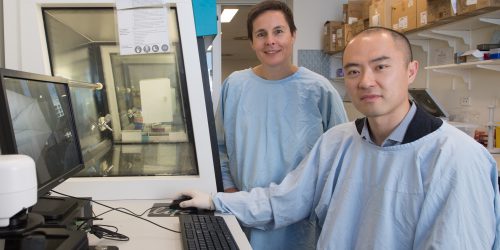
Lead Researcher: Professor Gemma Figtree
With an Australian experiencing a heart attack every 9 minutes it’s so important for us to be able to improve risk prediction. Professor Figtree and her team have developed a platform to discover and validate blood markers that will significantly improve heart attack risk prediction. The platform takes us a step closer to being able to have a simple blood test that could identify heart attack risk 10-15 years before someone experiences one.
The research team are looking for novel blood markers and mechanisms that identify people with atherosclerosis well before they suffer any untoward events such as a heart attack or cardiac arrest. They have established a large cohort study of patients who are at risk, or suffering from coronary artery disease. Patients volunteer, and consent to contribute a blood sample and their de-identified data to the study, allowing us to study new mechanisms of coronary artery disease.
The team is also investigating factors that may explain individual susceptibility and resilience to the well established cardiovascular risk factors, aiming to identify new markers and therapies to reduce the burden of cardiovascular disease.
Their program is driven by the increasing number of heart attack patients who, having no risk factors, are asking “why me”? Over the last decade this percentage has increased from 13% to 27%, independent of age or sex, which highlights the need for ongoing efforts to unravel the “missing” biology of coronary disease.
Professor Figtree’s team have established a large cohort study of patients who are at risk or suffering from coronary artery disease. The BioHEART study aims to recruit 5,000 stable adult patients undergoing clinically indicated CT coronary angiogram (CTCA) (BioHEART-CT), and 2,000 patients presenting with acute Myocardial Infarction (STEMI) (BioHEART-MI). To date, the team have recruited 3,000 BioHEART-CT and 653 BioHEART-MI patients and their associated blood samples.
The team continue to expand the BioHEART biobank resource which has benefited by pilot funding from Heart Research Australia and have completed the screening of the first 1000 patient samples. Using the team’s state-of-the-art lipidomic, metabolomic, proteomic platforms the investigators have profiled many thousands of our BioHEART samples providing multiple large datasets that are being used for the identification and development of biosignatures for coronary artery disease (CAD). Integration of these data with genomic data on the same individual provides the ability to make causal inference about specific metabolic pathways and so select the optimal biomarkers. The team have made exciting discoveries in the identification of new therapeutic targets and mechanistic insights into CAD that will be validated, translated into primary care, and commercialised in the future.
The team continue to expand the collaborative research team nationally and internationally, and are currently working on opening 5 new study sites in Australia. Thanks to the generosity of donors, the dedicated team has moved closer to the next leap in the improved therapeutic care of patients with coronary artery disease.
The work done by Professor Figtree and her team will help improve early identification of coronary artery disease and atherosclerosis beyond traditional risk factor assessment and will help guide personalised preventative therapies.
